Ol' Brokeback Got Me Good: My Brokeback Mountain Review
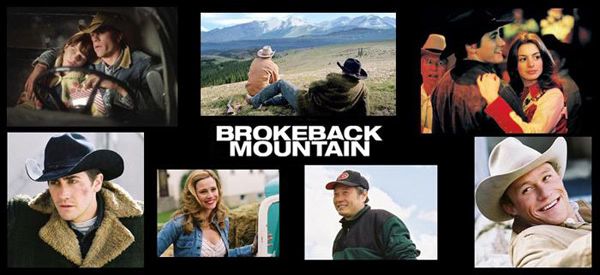
PLEASE COMMENT ON THIS POST! It took me a few hours to write, so I'd appreciate any thoughts. When you see the film, please tell me what you thought.
For those of you worried about seeing this film because of the gay content, let me assure that it is NOT explicit. It may not be something you have seen before in a film, but the film’s more disturbing scenes are those of violence. At least, I hope you would think that. I'd also add that this story was written 1997. A full year before what happened in 1998. I don't want to spoil anything, but please don't be one of those people who thinks this is just ripping things from headlines to shock.
Sorry for the delay in commentary. I’m sure you lost sleep wondering what I thought of the film. :-)
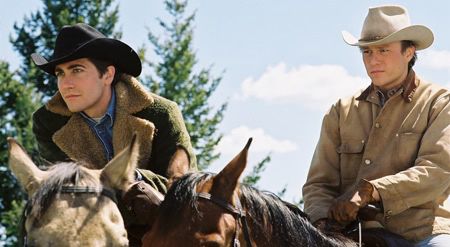 I had the privilege of the seeing the film at a special screening in NYC on Sunday at the Walter Reade Theatre near Lincoln Center. The screenwriters were present, as I previously mentioned. The second screening was an Entertainment Weekly sponsored screening in Philadelphia (home to me for a brief year some time ago) on Thursday evening. It was wonderful being able to see this film twice before its theatrical release. Both audiences applauded at the end of the film.
I had the privilege of the seeing the film at a special screening in NYC on Sunday at the Walter Reade Theatre near Lincoln Center. The screenwriters were present, as I previously mentioned. The second screening was an Entertainment Weekly sponsored screening in Philadelphia (home to me for a brief year some time ago) on Thursday evening. It was wonderful being able to see this film twice before its theatrical release. Both audiences applauded at the end of the film.During my first viewing of the film I found it hard to appreciate the film as a film. I knew practically every line and event coming, which doesn’t have anything to do with reading spoilers in other reviews so much as it does as knowing the short story the film is based on inside out. Instead, there was this awful checklist in my mind and I was mentally scratching off events as they occurred. This just happened, now this is coming next. That’s no way to view a film. After the first viewing, I still didn’t feel like I had seen Brokeback Mountain: The Movie so much as I had just read the short story again. I could appreciate the various elements in place such as the acting, cinematography, etc. You get the picture? Lucky for me, my seemingly dismal karma realigned itself and allowed a second viewing to take place only several days after the first viewing. Otherwise, I might have had to wait a month as I mulled over several things.
What you essentially get on screen is the short story, nothing added, rather expanded. Only a few events and lines of dialogue have been dismissed. But for everything missing, something else has been touched on that may have only been hinted at. That’s exactly how it all should have played out.
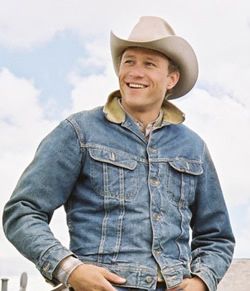 Brokeback Mountain is the story of two poor country boys, not a day over twenty, who are hired as ranch hands to tend sheep on the fictional, majestic Wyoming mountain. The stoic one is Ennis Del Mar (Heath Ledger) who doesn’t say much and mumbles a lot. Jack Twist (Jake Gyllenhaal) is the more lively of the two, a wannabe rodeo rider. The two begin the summer of 1963 doing their job on the mountain, but as the days go on, they forge a friendship. Eventually one cold night of drinking, Ennis sleeps outside the tent freezing when Jack invites him in. Half passed out, Ennis finds himself fully awake when Jack makes a sexual advance, one Ennis at first violently rejects then violently reciprocates. In the morning, they say nothing. Meeting up later in the day overlooking the sheep, Ennis refers to the events as a “a one shot thing” and Jack adds “it’s nobody’s business but ours.” The next night, they tenderly make love. And thus, the epic saga of Brokeback Mountain begins.
Brokeback Mountain is the story of two poor country boys, not a day over twenty, who are hired as ranch hands to tend sheep on the fictional, majestic Wyoming mountain. The stoic one is Ennis Del Mar (Heath Ledger) who doesn’t say much and mumbles a lot. Jack Twist (Jake Gyllenhaal) is the more lively of the two, a wannabe rodeo rider. The two begin the summer of 1963 doing their job on the mountain, but as the days go on, they forge a friendship. Eventually one cold night of drinking, Ennis sleeps outside the tent freezing when Jack invites him in. Half passed out, Ennis finds himself fully awake when Jack makes a sexual advance, one Ennis at first violently rejects then violently reciprocates. In the morning, they say nothing. Meeting up later in the day overlooking the sheep, Ennis refers to the events as a “a one shot thing” and Jack adds “it’s nobody’s business but ours.” The next night, they tenderly make love. And thus, the epic saga of Brokeback Mountain begins. The two part ways at the end of the summer with Ennis simply saying “see you around” as Jack, clearly yearning for something more, has no way to respond. Four years pass. Ennis has married his sweetheart Alma Beers (Michelle Williams) and now has two daughters, Alma Jr and Jenny (Francine in the short story.) He works poor paying jobs, and Alma eventually has to take a job at a grocery store to compensate. Jack has now moved to Childress, Texas to allow his dreams of becoming a rodeo king to come true. There, he doesn’t exactly fail, but has a hard time making it big. During one show, he meets a female rodeo rider, the well-off Lureen Newsome (Anne Hathaway). Lureen is forward and moments after meeting, the two are parked along side a road about to have sex. Lureen asks if she’s moving to fast, “Fast or slow, I just like the direction you’re going.” Might as well mean “Male or Female, I just want to get off.” Lureen eventually fathers Jack’s son and the two begin a marriage that is more like a partnership than a relationship.
Jack sends word back to Signal that he is passing through on business – he now works for Lureen’s “stud duck” of a father. The two agree to meet up and what happened on the mountain years earlier has affected them deeply. Jack suggests they could live together, but Ennis recalls a disturbing event in his past where a man was beaten to death and castrated, left for dead in a ditch because he was gay and lived with another man. With no real thoughts on how to deal with the situation, they agree to meet up annually on the mountain and spend several days with each other. And so it goes…
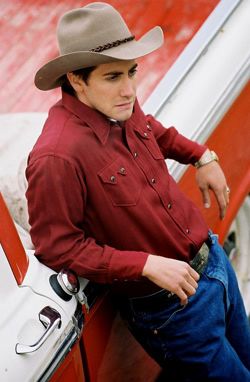 The years wear on, characters come in and out of their lives. Jack, once vivacious and a free spirit, has conformed and Gyllenhaal fully utilizes those sad, puppy dog blue eyes. Ennis grows increasingly confused and bursts with fits of violence, pushing those who care for him away. I’ll stop there, but know what follows is not a happy picture.
The years wear on, characters come in and out of their lives. Jack, once vivacious and a free spirit, has conformed and Gyllenhaal fully utilizes those sad, puppy dog blue eyes. Ennis grows increasingly confused and bursts with fits of violence, pushing those who care for him away. I’ll stop there, but know what follows is not a happy picture. This is that rare of rarity, a movie where everything falls into place. There’s not a weak link to its name.
Shall we start with the writing? We shall. The screenplay is written by Larry McMurtry and Diana Ossana, who deserve credit for fleshing out all of the details perfectly, for creating rich and vivid characters – lead and supporting. Most of all, they deserve credit for barely changing anything about the short story. Whereas most adaptations have to subtract, this one has to extend. I refuse to say “add.” Everything was already present, a blueprint waiting to be realized. There are several omissions from the story to the screen that I wish had been present. The prime example being Jack’s flashback to the emotional abuse his father provided. But within the context of the film, I’m not sure it would’ve worked. You sort of see everything you need to about Jack’s father late in the film.
McMurtry’s sole other feature film screenwriting credit is The Last Picture Show, of which we see shades here especially in the depiction of the barely changing small town lives. Whereas that film stood firmly between World War II and an uncertain, but hopeful American future, this one is in between the values and traditions of the new and old American West. In the old, cowboys were heroes and idols, something for young men to aspire to be. In the changing landscape, there’s barely room for them. As the film progresses, the cowboy becomes a relic of the past. Picture Show also is the definitive ensemble-actors movie. Brokeback isn’t an ensemble film, but it is an actor’s movie through and through. McMurtry and Ossana will win Oscars for their prestige project and deservedly so. As much as I love Picture Show the more apt comparison would be The Bridges of Madison County: classic rural setting, intimate and epic, wildy romantic, and filmed in a very old fashioned way.
Onto those actors. See, great performances lies in having the right actor for the right part. In the wrong part, the best of actors can look bad. I don’t think there is an actor out there who can play every part. I, personally, blame miscasting on whatever embarrassments have fallen on any of these actors before this film. Now, here it comes: Heath Ledger gives the best, most radical change of pace performance since Charlize Theron in Monster. It’s a performance like this that completely takes an actor who many thought was nothing more than a teen idol, an Aussie brute designed for the purpose of making young ladies swoon and then 10 years later wonder “hey, whatever happened to that guy?” and into the realm of, dare I say it?, Marlon Brando and Robert De Niro. Ledger may never give another great performance in his life, and he doesn’t need to. He’s reached a level with Ennis Del Mar that other actors only dream of touching. As the critic of the New York Times said, this is one for Hollywood history. Look at Ennis’ hands when he’s massaging a woman’s feet or eating pie towards the end and compare it to the way he handles the left behind sweater at the film’s end. You see range in his hands. He’s that good. His lovely bottom boy deserves just as much praise. Unfortunately for him, he gives the year’s best supporting male performance up against what is undoubtedly one of the best lead performances in a long time. Jack is obviously the more character, the one the audience can relate to more. And I’ll be damned if during the film’s first act when he is staring straight ahead trying to avoid what is going on to his left, you just don’t want to scream “LOOK, DAMN IT!” You’ll know what I’m talking about when you see the film. He’s the guy you fall in love with, but Ennis is the one who stays with you long after the film has ended.
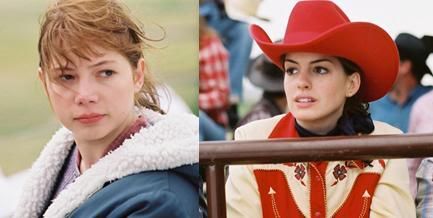 Hey, there’s women in this! And what gals they are! Such as Jake’s plight, Michelle is stuck with having the Oscar clip to end all Oscar clips. She’s so phenomenal in her confrontation scene that I think many forgot just how subtle, yet expressive she is in several other scenes. Her eyes say it all. Ang Lee is famous for the way he uses “quiet glances” and Williams is the reigning queen of those in the film. Michelle demonstrates the ability of a fine character actress, with the face of the sweet girl next door. Miss Hathaway is seen less yet has a strong arc. Lureen is only described two times in the story: first, as a sweet Texas rodeo queen. Secondly, again as sweet, but as cold as snow. These descriptions are about 15 years apart, and Hathaway is only seen in spades in the film. Her total screentime doesn’t exceed 10 minutes. However, you see that arc. In particular, Hathaway’s final scene may be one of the few that plays better in the film than it does in the book. That icy, cold detachment in her voice is eerily there, and that little bit of breaking Hathaway gives Lureen in her triumphant final scene lets the actress slam that baby right out of the ballpark. A lot has been written about potentially being distracted by some of the wigs of the character, but she is a wealthy, tacky Texas woman. What do you expect?
Hey, there’s women in this! And what gals they are! Such as Jake’s plight, Michelle is stuck with having the Oscar clip to end all Oscar clips. She’s so phenomenal in her confrontation scene that I think many forgot just how subtle, yet expressive she is in several other scenes. Her eyes say it all. Ang Lee is famous for the way he uses “quiet glances” and Williams is the reigning queen of those in the film. Michelle demonstrates the ability of a fine character actress, with the face of the sweet girl next door. Miss Hathaway is seen less yet has a strong arc. Lureen is only described two times in the story: first, as a sweet Texas rodeo queen. Secondly, again as sweet, but as cold as snow. These descriptions are about 15 years apart, and Hathaway is only seen in spades in the film. Her total screentime doesn’t exceed 10 minutes. However, you see that arc. In particular, Hathaway’s final scene may be one of the few that plays better in the film than it does in the book. That icy, cold detachment in her voice is eerily there, and that little bit of breaking Hathaway gives Lureen in her triumphant final scene lets the actress slam that baby right out of the ballpark. A lot has been written about potentially being distracted by some of the wigs of the character, but she is a wealthy, tacky Texas woman. What do you expect? And for all the heteromales/homogals, you do see Anne’s and Michelle’s breasts. (Hey, gotta pander, don’t I?) For the rest, you get a some male ass and a nude-jumping-off-the-rocks-into-the-water scene. Though Anne and Michelle leave their mark, the best female moments come later in the film in the form of a mother’s acceptance and a daughter’s hope. Moving stuff.
Anna Faris, sadly, appears only for a brief scene. I’ve noticed that the actress seems to take small parts in great films (Lost In Translation, May) and big parts in bad films (Just Friends, Scary Movie 2) but I’ll take whatever Anna I can get. The scene where her on-screen husband (Tony-nominated stage actor David Harbour) makes a crack at her expense got the biggest laugh at both screenings I attended. The character of Cassie (Linda Cardellini) is alluded to in a single sentence in the short story, as is the grown up Alma, Jr (Kate Mara.) Mara is a fresh talent I want to see more of. Both characters haven’t been given much in life, yet face it all with sweet and gentle warmth.
Given that the film takes place over 20 years and with all those characters coming in and out, you need some strong editing to keep this baby flowing. The word ‘slow’ has been used way too much to describe the pacing. Perhaps the more positive sounding absorbing is appropriate. I’ve never found any of Ang Lee’s films particularly slow, all of them were properly paced. There were two editors working on the film, as the original woman, Geraldine Peroni committed suicide just as production ended. The film’s dual flashbacks are fitted to the film at just the right moments. I was surprised just how effective the second one works. That dizzying shot of Jack in a dreamlike state says everything that needs to be said. This happens to be many people’s favorite moment of the short story, and I thought maybe they kept the continuity of the story by having it occur earlier. Alas, it was used late in the film just as it was in the short story.
It would be very hard to make the grand vistas of “Wyoming” (actually Calgary) ugly. But taking a break from just how gorgeous and gargantuan the backdrop is, let me say who the blue sky presented in a film has never seemed so blue. What’s particularly amazing about Rodrigo Priteo’s lush cinematography is that he fully resists the urge to any masturbatory shots. (This, I firmly believe, is where Gus Van Sant had he chosen to directe it, would’ve fucked things up. I also think his obsession with slightly kitschy garb would’ve been too distracting. Sorry for the tangent. Back on track…) There are some that inspire awe, but never did I feel that what I was seeing was in any way manipulative. The land exists as the background, and the characters are in the foreground. It’s a visual film with many extraordinary shots – the first image is quite glorious – but it’s secondary. The intimacy and later isolation is depicted brilliantly (i.e. Lureen’s final scene, done in closeup; and another closeup, the hotel scene). The final shot of the film is one of the best in modern cinema.
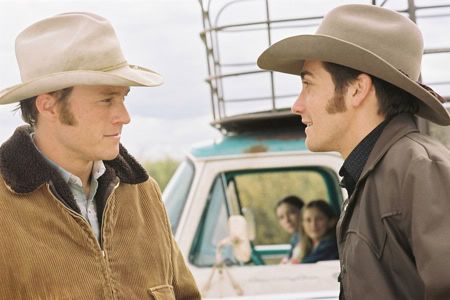 Gustavo Santaolalla is fastly becoming the most exciting film composer working. This is, by far, his crowing achievement. The blend of guitar and violins in the score creates such a sad, contemplative mix. The track on the soundtrack titled “The Wings” – used twice in the film, most effectively at the end – is one of the most heartbreakingly beautiful pieces of film music I’ve ever heard. It adds an extra layer of sadness to the film with the way the music flows over that final scene when you consider a line of a dialogue Ennis tells his daughters earlier in the film. Think for a moment about what “The Wings” is referring to. You know all those sappy scores that typically accompany films like this? You won’t hear any of that here. Gustavo also wrote several of the songs in the film, the apex being “A Love That Will Never Grow Old” which I was hoping would be better utilized in the film. (It’s the song that’s playing in Jack’s truck on his way back from Wyoming before he goes to Mexico.) Watch for a cameo by indie rocker Mary McBride as a country bar singer singing another one of the soundtrack’s great tunes “No One’s Gonna Love You Like Me.” All of the music in the film fits perfectly. There is even some more famous stuff present such as Linda Rondstadt’s “It’s So Easy.”
Gustavo Santaolalla is fastly becoming the most exciting film composer working. This is, by far, his crowing achievement. The blend of guitar and violins in the score creates such a sad, contemplative mix. The track on the soundtrack titled “The Wings” – used twice in the film, most effectively at the end – is one of the most heartbreakingly beautiful pieces of film music I’ve ever heard. It adds an extra layer of sadness to the film with the way the music flows over that final scene when you consider a line of a dialogue Ennis tells his daughters earlier in the film. Think for a moment about what “The Wings” is referring to. You know all those sappy scores that typically accompany films like this? You won’t hear any of that here. Gustavo also wrote several of the songs in the film, the apex being “A Love That Will Never Grow Old” which I was hoping would be better utilized in the film. (It’s the song that’s playing in Jack’s truck on his way back from Wyoming before he goes to Mexico.) Watch for a cameo by indie rocker Mary McBride as a country bar singer singing another one of the soundtrack’s great tunes “No One’s Gonna Love You Like Me.” All of the music in the film fits perfectly. There is even some more famous stuff present such as Linda Rondstadt’s “It’s So Easy.” When you have all of these elements, all with the potential to be great and it all comes together, you know it’s the work of a master. Ang Lee, that would be. Brokeback Mountain contains many elements and themes he’s examined before: societal repression, homosexuality, class examinations, forbidden love, epic grandeur, quiet intimacy and angry men that go into fits and leap miles into the air. Okay, so it doesn’t have that last one. It doesn’t have an Aussie in the lead like Hulk. I once read the mark of a great director is that you never see the directing. You can’t see the strings being pulled, or the pieces of the puzzle individually being placed together. It just all is there for you to see and take in. That’s the mark of Ang Lee. He’s a very old fashioned filmmaker, no modern kicks involved. This is his strongest work yet, an amazing feat given the masterpieces that are Crouching Tiger, Hidden Dragon and The Ice Storm.
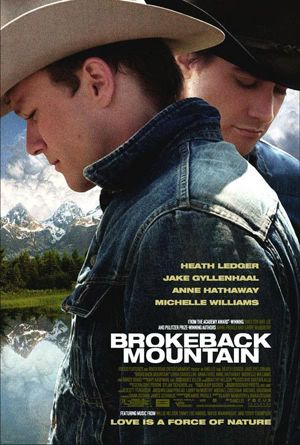 THE BOTTOM LINE:
THE BOTTOM LINE:A revolutionary concoction of indie, romance, epic, mainstream, actor’s showcase, gay-themed and western, Brokeback Mountain is one of the defining motion picture events of our time. This is a film for people who love cinema, who dare to be moved by an art form. With it’s illustrious director at the height of his power, several of the performances of the year, stunning visuals and sweeping score, it gets everything right. In an age when films are manufactured for box office and awards just to get box office, Brokeback Mountain dares to take something old and make it new again. It soars to new highs, but in the end, no matter how high this mountain may be, there’s no denying that lingering feeling it leaves. It floors you.
Those sheep, however, were Razzie-worthy. :-)

6 Comments:
alright, i must admit i lost just a little sleep waiting for your review!
man, can't wait to watch it. great review!
speaking of Heath's change of pace performance, i always thought he did Lords of Dogtown brilliantly enough to break out of that teen idol/Aussie brute typecast.
He was great in Dogtown, I thought. I think that was the first hint that he was going to take what he showed in Monster's Ball and run with it. Hopefully he keeps it up.
Do you have any idea when you'll get the film in your area?
well, a pirated dvd should be out within the next two weeks but it would most likely be a terrible copy.
i'd rather hold out a month or two for a good original copy i can really enjoy.
that's just how things work here :)
Hold out for the big screen if you can. It demands to be seen there. Such emotion and visuals don't always translate that well to the small screen.
I've been waiting to read this since I don't know much about the film itself. All I can say is if it wasn't for you I probably wouldn't want to see the movie, especially if it didn't come to our theatre. Your review was Phenomenal! How you touched on all aspects of the film and seen things in films that I never notice. You have a true gift with movies. Thanks again for posting and do you know if is going to come anywhere in our area soon?
Post a Comment
<< Home